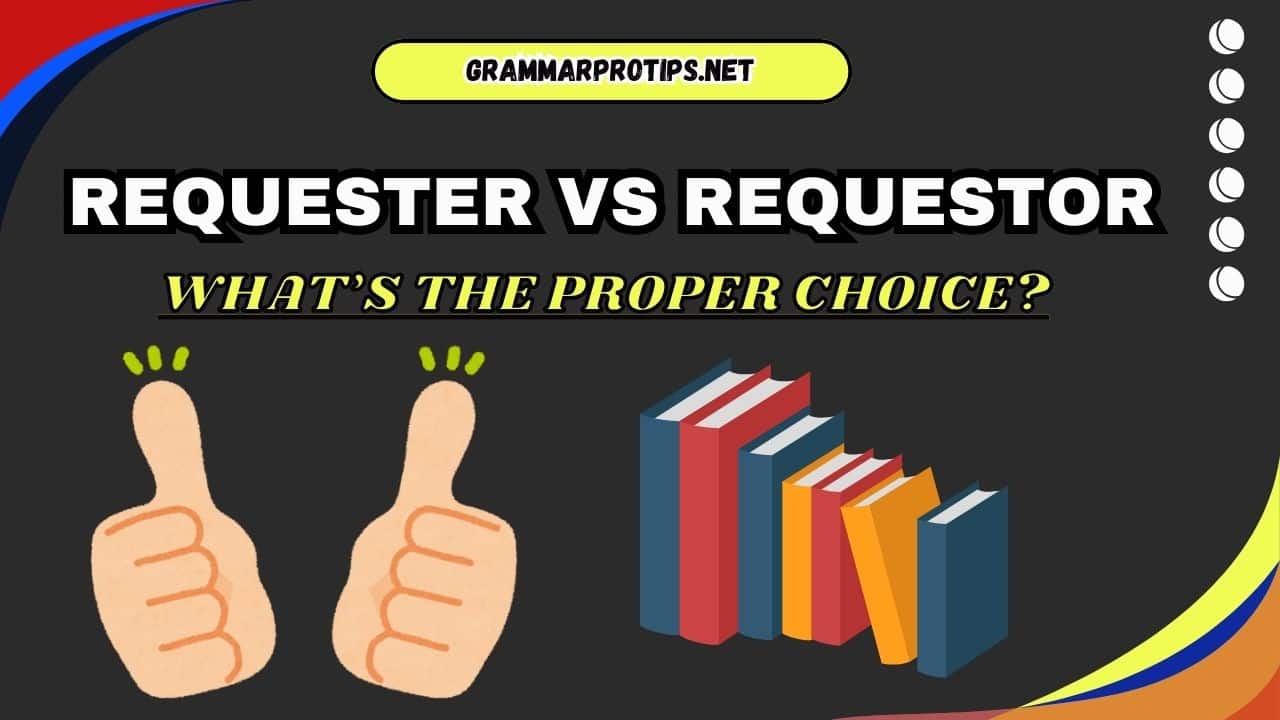Requester vs Requestor: The English language is constantly evolving, and so are the words we use. One such pair of words that often causes confusion are “requester” and “requestor.”
While these two terms are quite similar in meaning, they have distinct usages based on regional preferences, language trends, and the context in which they are used.
In this article, we will explore the usage differences, spelling variations, and context-based preferences between the two terms.
We will also provide examples to illustrate how each word might be appropriately used in different scenarios, from informal writing to formal documents.
Understanding the Terms: Requester vs Requestor
Both “requester” and “requestor” are derived from the verb “request,” meaning to ask for something. As nouns, they refer to someone who makes a request.
Despite this similarity, there are subtle differences that could influence which version is the better choice in various contexts.
- Requester: This version of the word is the more common form in American English (US English). It’s typically used in everyday language, casual speech, and even informal writing.
- Requestor: This variant is less common but still used in specific contexts, particularly in formal language, such as legal terms, business contexts, and technical writing.
Language Trends and Usage Differences
Both “requester” and “requestor” have been in use for centuries, but the preference for one over the other often boils down to regional differences in language usage. Here’s a closer look at how these two terms are used in different parts of the world:
Requester vs Requestor in American English
In American English, the term “requester” is overwhelmingly preferred. It has become the standard term in most situations, from business emails to customer service interactions.
It’s used in both formal and informal contexts, but it’s especially common in the US English form of informal writing and general usage.
For example, consider this scenario where a customer reaches out to a service team:
Email Example:
Subject: Request for Support
Dear Jane,
I hope you’re doing well. I am writing to inquire about a potential issue with my account. As a requester of assistance, I would appreciate your guidance in resolving the matter.
Best regards,
Michael Thompson
Here, the use of “requester” is clear, natural, and effective in informal language.
On the other hand, “requestor” appears less frequently in US English for everyday language, and is typically reserved for specialized writing or legal language. American usage has leaned toward simplicity and ease, favoring “requester” in more general usage.
Requestor in British English
In British English, “requestor” can be seen more often in formal documents, legal language, and technical writing.
The preference for this term in the UK English might be due to the more traditional nature of the British language and the influence of older, more formal terms in writing.
For instance, in formal business communication, a “requestor” might be used to refer to someone who has formally asked for a product or service.
Email Example:
Subject: Contract Amendment Request
Dear Mr. Carter,
I am the requestor of the amendment to the contract signed last month. As per our discussions, I would appreciate it if we could finalize the changes by the end of this week.
Kind regards,
David Simmons
In this example, “requestor” sounds more professional and appropriate, aligning with formal context and business language.
Word History and Evolution
The historical development of these terms is also interesting. Both “requester” and “requestor” were coined as derivatives of the verb “request,” but their paths diverged over time.
The term “requester” seems to have evolved as a more modern form, while “requestor” may have held on to its older roots in legal language and formal documents. This evolution can be viewed as a language development that reflects the changes in language preferences over time.
Requester in Formal Contexts
Although “requestor” is often preferred in more formal language, the use of “requester” in professional writing has gained acceptance, especially in less formal communication such as emails or internal memos.
While “requestor” may still be the preferred term in legal documents or contracts, “requester” is often seen as a simpler, more user-friendly alternative in general business contexts.
For example, in contracts or legal language, you may find the following:
Contract Excerpt Example:
Section 3.1: In the event that the requestor fails to provide the necessary documentation within the required timeframe, the terms of the agreement will be considered void.
Here, “requestor” fits the legal language and formal tone of the document.
Requester in Informal Writing
In contrast, when it comes to informal writing, “requester” is far more common and appropriate. Whether you’re drafting a personal email or making an online inquiry, “requester” will usually sound more natural.
Consider this casual message:
Email Example:
Subject: Help with My Account
Hi Sarah,
I’m a requester of a refund for my recent purchase. Could you please let me know the next steps in processing this?
Thanks,
Tom
In this case, the use of “requester” is much more fitting for the informal nature of the communication.
Regional Preferences and Language Trends
As we’ve seen, regional preferences play a significant role in determining which term to use. In American English, “requester” is the go-to choice in most contexts, whether formal or informal.
Meanwhile, in British English, the term “requestor” might still hold some weight, especially in legal or technical writing.
However, as language evolution continues, we are seeing language preferences shift toward simpler forms, with “requester” becoming more acceptable in formal contexts, even in places where “requestor” used to reign supreme.
This change reflects the broader language trends of modern language moving towards conciseness and clarity.
Final Thoughts: Choosing the Right Term
So, what’s the proper choice? Requester and requestor are both valid terms, but the right one depends on the context and audience.
If you’re writing in a formal or legal context, “requestor” may be your best option. But if you’re drafting a casual email or working in business communications, “requester” is likely the better fit.
- Requester: Ideal for informal writing, casual speech, or general usage in American English and even modern professional writing.
- Requestor: More appropriate for formal documents, legal language, contracts, or technical writing.
By keeping these usage trends in mind, you can select the term that best aligns with the tone and purpose of your writing.
Read more knowledgeable blogs on Grammar Pro Tips

Sienna Mauldon is a passionate writer and grammar expert. On her blog, she shares easy-to-follow guides to help readers master grammar rules and improve their writing. With a love for language and teaching, Sienna makes grammar simple and fun for everyone, from beginners to experienced writers.








